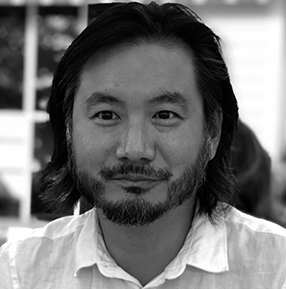You crawled back into your motel in a border town near the demarcation line between the nation-state of the living and the underworld. Sleepless, you peered out the window. You could see the neon lights garlanding the Gates of Horn and Ivory. The lights spelled out “OPEN 24 HOURS A DAY” in blinking red cursive. You laughed. Of course, death is the only border crossing still open to all. You watched the illumination from the street pour onto the wall above your bed: a red lasso that looped on the wall, as if the wall had begun to bleed extravagantly. Below, traffic packed the road in both directions. From the two open gates, dreams sailed into the living world from over the deserts. Some dreams true, some false. You recognized some of these dreams (Race, Nation, Gender) and could not tell from which gate they had emerged. Sleepless, you saw the line of pilgrims queued up to enter the underworld. The line seems longer lately, new refugees to the afterlife.
Copyright © 2019 by Ken Chen. Originally published in Poem-a-Day on December 31, 2019, by the Academy of American Poets.
“In 2011, I helped organize a delegation to the border where Arizona met Mexico. We saw American soldiers carrying automatic weapons at Sasabe and Nogales, drove to the Tent City, and saw a judge try 70 migrants handcuffed together in forty minutes. In Arizona, I was inspired by those we encountered: Coalición de Derechos Humanos, Puente and its Barrio Defense Committees, NDLON, The Florence Project, and the Tohono O'odham nation, which has lived on both sides of the border for thousands of years. Hope fails us, the poet Juan Gelman wrote; grief never does, but you must not be ‘deluded by grief’ for this reason. You must not abandon hope. This poem comes from a book, tentatively called Death Star, about my travels to find my father in the country of the dead, where I find those who colonialism killed, and to migrate him to the land of the living.”
—Ken Chen

